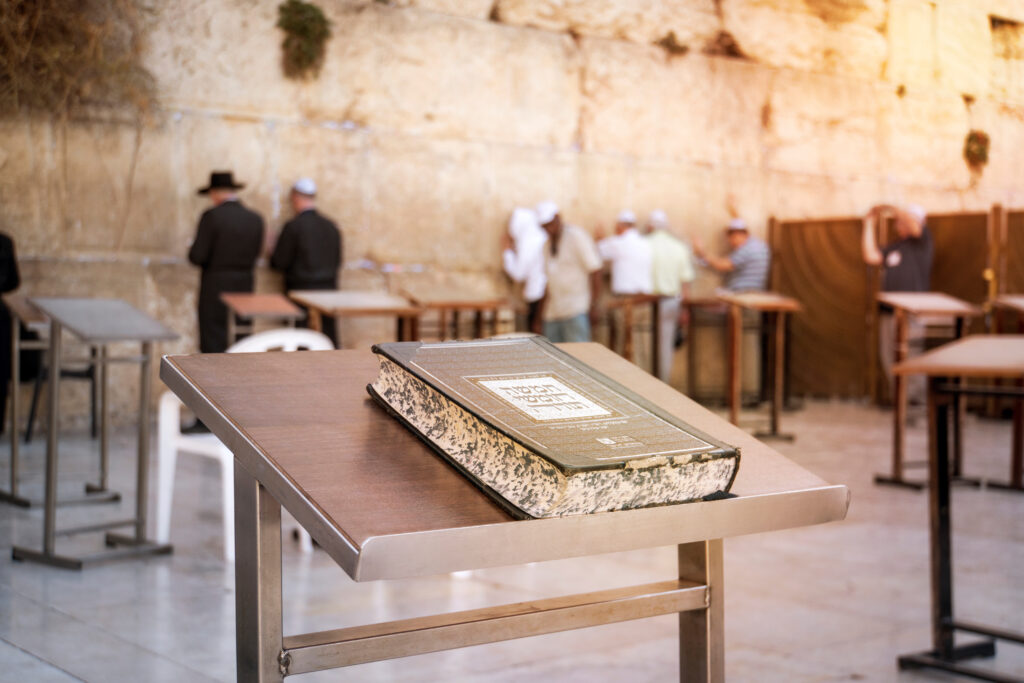Torah Observant Christians
In Acts 15, we find the early church wrestling with a weighty question that seems to be resurfacing today: should Christians observe the Torah and follow the Law of Moses? If so, how?
Now that the way of salvation by grace through faith in Jesus was open to the Gentiles, how should they live? And what must they do in order to belong? Did Gentile believers need to take on the yoke of the Mosaic Law and adhere to a Jewish lifestyle?
Let’s see how the Word of God addresses Christians observing the Torah:
The apostles and the elders were gathered together to consider this matter. And after there had been much debate, Peter stood up and said to them,
“Brothers, you know that in the early days God made a choice among you, that by my mouth the Gentiles should hear the word of the gospel and believe. And God, who knows the heart, bore witness to them, by giving them the Holy Spirit just as he did to us, and he made no distinction between us and them, having cleansed their hearts by faith.
“Now, therefore, why are you putting God to the test by placing a yoke on the neck of the disciples that neither our fathers nor we have been able to bear? But we believe that we will be saved through the grace of the Lord Jesus, just as they will.” Acts 15:6-11
The verdict from the apostles and elders was emphatic: Gentile believers were not required to follow the Law of Moses (Acts 15:1-32). Meaning, they were grafted into Israel’s “olive tree” not by works but by faith (Rom 11:17-24; Eph 2:8-9).
Gentiles could belong to the covenant community of faith without having to become Jewish. And all the Gentiles rejoiced.
End of the Law?
Scriptures make it clear that those who put their faith in Jesus, whether Jew or Gentile, are not under law but under grace (Rom 6:14). No person is justified or made righteous by the works of the law (Gal 2:16-21). For Christ is the end [telos: goal, fulfillment] of the law unto righteousness for everyone who believes (Rom 10:4).
So, through Jesus, our perfect mediator, God fulfilled His word and established a New Covenant with the house of Israel. It is a covenant unlike the one made at Sinai (Heb 9:11-15).
He would take what was external – the ordinances and commands that were a copy and shadow of more perfect things (Heb 8:5; 10:1). Then, He would write His Law on our hearts (Jer 31:31-34). In light of the New Covenant, the author of Hebrews says the Law is now “obsolete” and ready to “vanish away” (Heb 8:13).
So apparently, the Law is over and done with now that we are in the dispensation of grace. Case closed, right? But perhaps it’s not so simple.
Christians Observing the Torah in the Words of Jesus
Jesus himself declared,
“Do not think that I have come to abolish the Law or the Prophets; I have not come to abolish them but to fulfill them. For truly, I say to you, until heaven and earth pass away, not an iota, not a dot, will pass from the Law until all is accomplished.
“Therefore whoever relaxes one of the least of these commandments and teaches others to do the same will be called least in the kingdom of heaven, but whoever does them and teaches them will be called great in the kingdom of heaven.” Matthew 5:17-19
Jesus did not abolish the Law. He was born under the Law (Gal 4:4-5) and perfectly fulfilled the righteous requirements of the Law. The New Covenant indicated that God’s Torah (law, instruction) would be written on our hearts (Jer 31:31-34).
So wouldn’t that mean continued adherence to the Law?
From Moses to the Apostles
Moses said in the Torah that the commandments of the Law are to be observed “throughout your generations” as statutes “forever” (Ex 12:14, 17, 27:2. 31:16). David delighted in the Law of the Lord and wrote countless Psalms about the joy and blessing of following God’s “perfect” law.
Throughout the New Testament, it appears that Paul and the other Jewish believers continued to live as Torah-observant Jews (Acts 18, 21:21-24; Rom 3:31). That is to say, the Law was part of Israel’s very identity. To Israel belong the covenants and the giving of the Law (Rom 9:4).
Paul says that “all Scripture is breathed out by God and profitable for training in righteousness” (2 Tim 3:16). This is in reference to the Hebrew Scriptures, which includes the Law.
And yet Paul also clearly says that those who have placed their faith in Christ are no longer under the supervision of the Law (Gal 3:23-25). He adds that through the Law he died to the Law so he might live to God (Gal 2:19). In addition, he says in Romans 7:6,
But now we are released from the law, having died to that which held us captive, so that we serve in the new way of the Spirit and not in the old way of the written code.
One New Man
In Ephesians, Paul speaks at length of the mystery of Jew and Gentile together in Messiah. That is to say, Gentiles have been grafted into Israel’s salvation story by grace through faith (Rom 11:17; Eph 2:8).
Jew and Gentile are now “One New Man” in Yeshua, united in the means of salvation by grace through faith. Yet they are free to embrace diversity and distinctiveness in manner of life and calling. Since Gentiles were never under the Mosaic Law, why endeavor to submit to it now?
But now in Christ Jesus you who once were far off have been brought near by the blood of Christ. For he himself is our peace, who has made us both one and has broken down in his flesh the dividing wall of hostility by abolishing the law of commandments expressed in ordinances, that he might create in himself one new man in place of the two, so making peace, and might reconcile us both to God in one body through the cross, thereby killing the hostility. Ephesians 2:13-16
So who got it right? Moses, David, Jesus, Paul, or the Jerusalem Council?
Jerusalem Council on Christian Torah Observance
The tender balance of walking out the decision of the Jerusalem Council in Acts 15 proved to be more than challenging. It was not as simple as a declaration clarifying that Gentiles were not obligated to follow the Law. In other words, it would imply that believing Jews would in some way continue to walk according to the Mosaic Law and Jewish customs.
The community of faith wrestled with various nuances of life under the New Covenant. For example, the balance of faith and works, the mystery of Jew and Gentile together in Messiah (One New Man), the enduring role of the Law, and the place of custom and tradition in identity.
The New Testament letters to Galatians, Ephesians, Colossians, Romans, and Hebrews all address these issues at length. Moreover, volumes continue to be written to this effect. So evidently, finding balance is not so straightforward.
How far we have come from that Acts 15 conversation about how to include Gentiles into the community of faith. Two thousand years of turbulent Jewish-Christian relations testify to this.
Away from Acts 15: The Parting of the Ways
The decision set forth by the Jerusalem Council, although liberating for Gentiles, quickly led to a vast distancing from the Jewish context of the faith. With the rapid spread of the gospel, the face of Christianity became increasingly Gentile and distant from its Jewish roots and context.
The One New Man conversation of Jew and Gentile together in Christ took a decidedly imbalanced pendulum swing towards the Gentile side. Meaning, it veered away from unity and towards uniformity.
The conversation turned from “you don’t have to be Jewish to live among us” to “you can no longer be Jewish and live among us” to, in the most extreme cases, “you can no longer be Jewish and live”. Antisemitism, sadly, has found deep roots in Church history.
The lion’s share of Church history over the past 2,000 years has been written with the ink of the Gentiles and often with the blood of the Jews.
The Remnant
The story of Jewish-Christian relations is deeply fractured and fraught with some of the darkest spots in human history. Could anything bridge the immense gap between us and bring healing and restoration?
God, true to His covenant promises, has miraculously preserved His chosen people throughout the generations for His name’s sake (Ezek 36; Rom 9-11).
Although the chasm between Christianity and modern Rabbinic Judaism is vast, there has always been a Remnant of Jewish believers throughout history. They maintained their distinct Jewish heritage and biblical covenant identity (Rom 11:5).
What seemed cut off and lifeless for generations, has sprouted once again. Out of ashes has come beauty. Israel as a nation is reborn. The dry bones are assembling and the breath of God is reviving the Remnant (Ezek 37).
There is a growing movement of Messianic Jewish believers in the Land and around the world. Israel – both land and people – has a way of maintaining center stage. Her very existence provokes a search for answers.
Returning to Acts 15
In nothing short of a miracle, the Church is turning once again to the conversation of Acts 15, yet in a new context.
There is an awakening in the global Church to God’s eternal covenant promises for Israel.
This turn of attention is full of hope. It breathes new life and vision into the understanding of God’s heart for Israel, her ongoing call to be a light to the nations, and the promise that “all Israel will be saved” (Rom 11:26).
This shift stokes the eschatological anticipation for a great harvest of souls among the nations and the return of Christ. It fuels prayer and alignment and is a beautiful invitation into valuable dialogue.
And yet it also propels us back to some of the same questions the early church wrestled with. Meaning, about the One New Man and the multifaceted nuances of living out the New Covenant.
Should Christians follow the Torah?
Believers have always wrestled with the tension between faith and works. However, there appears to be a renewed interest among many believers as to the role of the “Torah” in the life of a Christian.
Tandem with this is often a surge of interest in the Jewish roots of Christianity.
We believe this is the modern iteration of the Acts 15 conversation.
For some 2000 years, the Church has been predominantly Gentile in culture and practice, although there has always been a Remnant of believing Jews. But over the last century, we witnessed the rebirth of the State of Israel and the growth of the Messianic Jewish community.
Is that why we are now seeing a renewed interest in how Christians should relate to the Law and the Jewish roots of their faith?
The Rise of Jewish Trends within Christianity
Why would Gentile Christians, who were never under the Law of Moses, feel a gravitational pull to “Torah observance”, often expressed in a distinctly Jewish manner?
Guaranteed, had the technology been available, we would not have seen people blowing shofars, lighting Hanukkah candles, and Davidic-dancing in the streets of Toledo in 1492. Nor in Warsaw in 1942 upon discovering that they had Jewish DNA. So why do we see such trends now?
The Church, who for thousands of years has been hostile to or largely ignorant of the Jewish roots of Christianity, is at last turning her eyes with favor towards the Jewish people. There is renewed vision and purpose in Jewish believers worldwide who may have been distant from their own ethnic and cultural heritage as Jews.
What does it mean for them to flesh out their identity as Jewish believers? Is there space given to this in the Church today? A balanced approach to the ensuing conversations is not always easy.
Finding Balance: Head, Heart, Hand
An excellent theologian once taught that when we approach the realm of theology, we join an ongoing conversation of generations. We are invited to take a seat at the roundtable.
At times, we may either applaud or bristle at the voices that have contributed to this conversation throughout history. But wisdom would bid us first to listen and learn.
Ideally, right living should reflect a healthy balance of right belief, right heart or motive, and right action (orthodoxy, orthopathy, and orthopraxy). Imbalance in this equation is often where we see fringe groups arise. Truth is the razor’s edge between opposing heresies.
Jewish-Christian relations, questions about the Law, and the dialogue about the One New Man are not the entirety of the current conversation. Yet they are a significant part of the dialogue and may be the reason you find yourself reading this now.
There has been plenty of struggle with legalism and works-based righteousness entirely separate from the context of the One New Man or Israel.
The Gentile Church is turning favorably towards Israel and the Jewish people. This is a major shift from the historical trend. Could this be why we are seeing a renewed interest in how believers relate to the Torah? This discussion, like Acts 15, has great potential for healing and unity between Jew and Gentile. But we must both take a seat at the table to join the conversation.
The Pendulum of Extremes in Christians Observing the Torah
The awakening in the Church towards Israel is bringing us back to Acts 15. That is, to the goal of finding balance and unity between Jew and Gentile in the Messiah, without acquiescing to uniformity.
As Christians walk the journey of identifying more closely with the Jewish Roots of their faith, we will inevitably face a lot of the same questions and dilemmas.
These include the practical expression of the One New Man, the ongoing nature of Jewish and Gentile identities as well as their cultural distinctions. And also what it means to interact with Israel’s story (past and present) and with the Jewish people in a healthy, biblical and balanced way.
For generations, the conversations about faith and works, Law and grace have been discussed from a primarily Gentile, dare we say western, perspective. Perhaps key voices have been excluded from the table for a long time.
Living Acts 15
Can we return to Acts 15 to walk out this conversation in the context of the community of faith – Jew and Gentile together in Messiah?
Indeed, the balance must be found in the concept that we are One New Man – unified in faith and salvation, yet distinct in calling and purpose. The invitation to learn and to participate is wide open, but our hope and salvation are found in Jesus, not in Jewishness.
At this point, it would be an inexhaustible task to unpack the vast amount of scriptures or summarize the panoply of voices that have spoken into this conversation (see below for some recommended resources for further study). These conversations are ongoing, and will not be solved in a day.
But if in any way your attention has been piqued by the initial conversation at hand, I invite you to lean in. Pull up a chair at the roundtable and listen. Then let’s join the conversation of generations. We are living Acts 15.

How to Pray for Israel: Free PDF Download
Today, more than ever, Israel needs your prayers. Learn three simple and effective ways to stand with Israel in prayer, today.
We’ve put this guide together for you so that you are even better equipped to bless Israel as you pray for Her.
Articles Related to Christians Observing the Torah
Estimated reading time: 13 minutes
Recommended Resources:
- Reading Moses, Seeing Jesus: How the Torah Fulfills its Goals in Yeshua, Seth D. Postell, Eitan Bar & Erez Soref. Lexham Press, 2017.
- 60 Questions Christians ask about Judaism, Michael L. Brown, PhD. Chosen Books, 2011.
- One New Man: God’s plan to Reconcile Jew and Gentile, Ariel Laurence Blumenthal. Deep River Books, 2018.
- Torah Observance, Perspective Paper, Gateway Center for Israel
- Why are Christians Acting Like Jews? Podcast, A Jew and a Gentile Discuss
- The Pros and Cons of the Hebrew Roots Movement, Dr. Michael L. Brown
- The Torah from a Messianic Jewish Perspective, One for Israel
- One New Man, Hebrew Roots, Replacement Theology: How to restore the Jewish roots of the Christian faith without getting weird, David Rudolph, PhD, TKU
- Living Biblically, by Amy K.Hall, Stand to Reason
- Should Followers of Christ Observe the Torah, by Amy K. Hall, Stand to Reason
- The Law of Moses and the Law of Christ, Arnold G. Fruchtenbaum


